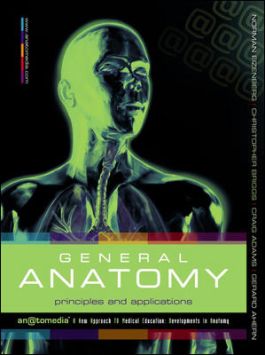General Anatomy
1st Edition
0070134677
·
9780070134676
© 2007 | Published: November 27, 2007
An@tomedia: General Anatomy - Principles and Applications integrates both regions and systems in a concise and easily understandable text.
This is a practically orientated book that introduces general anatomy concepts to medical, nursing and allied h…
Read More
Receive via shipping:
- Colour, print bound version of the complete text
SECTION I: THE HUMAN BODY
1: Human Anatomical Terms
2: Human Form and Structure
3: Human Sexual Characteristics
SECTION II: BODY SYSTEMS AND ORGAN STRUCTURE
4: Skeletal System and Bones
5: Articular System and Joints
6: Muscular System and Muscles
7: Integumental System and Skin
8: Visceral Systems and Viscera
9: Nervous System and Nerves
10: Arterial System and Arteries
11: Venous System and Veins
12: Lymphatic System and Lymph Vessels
SECTION III: BODY REGIONS AND ORGAN POSITION
13: Regions of the Body
14: Arrangement of Body Regions
15: Body Compartments and Fascial Planes
16: Body Wall and Cavities
17: Neurovascular Pathways
SECTION IV: HUMAN DEVELOPMENT AND VARIATION
18: Growth and Development
19: Normal Variation
20: Anatomical Variation in Structure
21: Anatomical Variation in Position
22: Pathological Changes
SECTION V: PRACTICAL PERSPECTIVES
23: Surface and Functional Anatomy
24: Radiographic Anatomy and Imaging
25: Sectional Anatomy, CT and MRI
26: Ultrasound Imaging
27: Endoscopic Anatomy
28: Clinical Procedures
29: Postmortem Examination of Organs
30: Cadaver Dissection
Appendix 1: Anatomical Principles
Appendix 2: Clinical Applications
Glossary: Derivation of Terms
Index
An@tomedia: General Anatomy - Principles and Applications integrates both regions and systems in a concise and easily understandable text.
This is a practically orientated book that introduces general anatomy concepts to medical, nursing and allied health students.
Containing essential information for immediate comprehension of anatomical concepts and principles, over 700 clear illustrations, diagrams and real pictures of dissections further assist clinical understanding.

